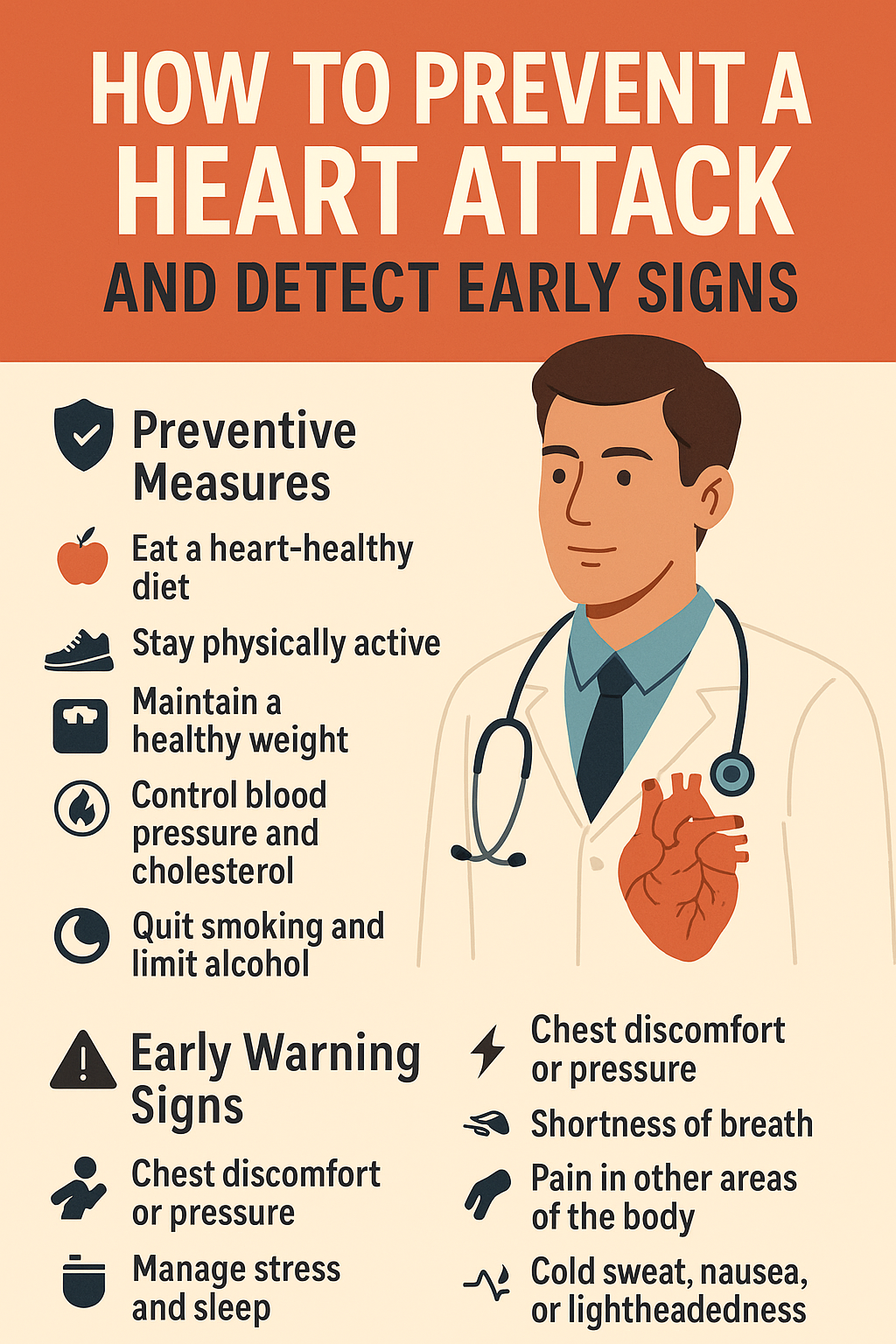
Heart attacks, also known as myocardial infarctions, are one of the leading causes of death worldwide. The good news is, they are largely preventable with the right lifestyle choices and awareness of early warning signs. Whether you’re in your 30s, 40s, or beyond, knowing how to protect your heart can be life-saving. In this article, we’ll cover how to prevent a heart attack and recognize the early signs so you can take action before it’s too late.
✅ What Causes a Heart Attack?
A heart attack occurs when the blood flow to a part of your heart is blocked, often due to a buildup of fat, cholesterol, and other substances (plaque) in the coronary arteries. This blockage can damage or destroy part of the heart muscle.
🛡️ Preventive Measures to Reduce Heart Attack Risk
1. Eat a Heart-Healthy Diet
Focus on foods rich in fiber, antioxidants, and healthy fats.
Include fruits, vegetables, whole grains, legumes, nuts, and fatty fish like salmon.
Limit processed foods, red meat, sugar, and sodium.
Consider the Mediterranean diet, which is proven to reduce cardiovascular risk.
2. Stay Physically Active
Aim for at least 150 minutes of moderate aerobic activity or 75 minutes of vigorous activity per week.
Simple activities like brisk walking, cycling, swimming, or yoga can make a big difference.
3. Maintain a Healthy Weight
Obesity is a major risk factor for heart disease. Try to keep your BMI (Body Mass Index) within the healthy range (18.5–24.9).
Losing even 5–10% of your body weight can significantly reduce heart disease risk.
4. Control Blood Pressure and Cholesterol
High blood pressure silently damages your heart and blood vessels.
Get your blood pressure checked at least once a year, and more often if it’s elevated.
High LDL (bad cholesterol) and low HDL (good cholesterol) can increase plaque formation.
If necessary, consult your doctor for medication.
5. Quit Smoking and Limit Alcohol
Smoking doubles your heart attack risk. Quitting has immediate and long-term benefits.
Alcohol should be consumed in moderation — no more than one drink per day for women and two for men.
6. Manage Stress and Sleep
Chronic stress increases blood pressure and heart rate.
Practice relaxation techniques such as meditation, deep breathing, or mindfulness.
Ensure 7–9 hours of quality sleep per night. Poor sleep increases heart disease risk.
⚠️ Early Warning Signs of a Heart Attack
Recognizing the early symptoms of a heart attack can save lives. Don’t ignore these common signs:
Chest discomfort or pressure: A feeling of tightness, fullness, or pain in the center or left side of the chest.
Shortness of breath: May occur with or without chest discomfort.
Pain in other areas: Discomfort in one or both arms, back, neck, jaw, or stomach.
Cold sweat, nausea, or light headedness.
Fatigue: Especially in women, feeling extremely tired even without exertion.
If you or someone around you experiences these symptoms, seek emergency medical help immediately. Acting within the first hour significantly improves survival rates.
🔍 Simple Tests to Detect Heart Disease Early
Early detection is key. Consider regular check-ups and tests such as:
Electrocardiogram (ECG/EKG)
Echocardiogram
Lipid profile test
Stress test
Coronary calcium scan (especially for people with family history)
💡 Final Thoughts
Heart attacks don’t happen overnight. They build up over years of poor lifestyle choices and unnoticed warning signs. But with preventive care, early detection, and healthier habits, you can dramatically reduce your risk.
Take charge of your heart health today — because prevention truly is better than cure.

